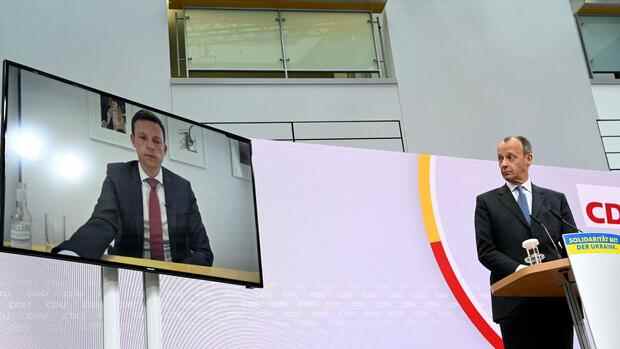Berlin It should have been a narrow defeat in Saarland, possibly a bit clearer. The CDU federal chairman Friedrich Merz would have appeared in front of the press on Monday and would have pointed out the peculiarities of state politics that would have led to Prime Minister Tobias Hans from the CDU now having to hand over power to the challenger Anke Rehlinger from the SPD. But a result as bad as it hasn’t been since 1955 and an absolute majority for the SPD?
“Not a good day” was the choice, admitted Merz on Monday in Berlin. “We win together, we lose together,” he clarified, putting it into perspective that it was a state election.
Above all, however, the result is “not a precedent for the elections that are still taking place this year. We are disappointed, but we are not going into the rest of 2022 depressed. We are going into these elections with confidence.”
The 66-year-old pointed out that the CDU and CSU are ahead of the SPD in federal polls. “We managed the turnaround,” he said, assessing the situation at federal level.
Top jobs of the day
Find the best jobs now and
be notified by email.
Because there is a lot at stake this year, they prefer to quickly look ahead in the CDU. In May, the citizens of Schleswig-Holstein and North Rhine-Westphalia elect new state parliaments.
Member of the Executive Committee Daniel Caspary was confident: “Even after yesterday’s election, we have a good chance of winning the state elections in the other two federal states. There are completely different issues and different rules.” Party leader Merz was already in Kiel and Düsseldorf at the start of the election campaign to support the CDU Prime Ministers Daniel Günther and Hendrik Wüst.
Like Hans from the Saarland, both are not yet 50 years old and are therefore considered youngsters for higher offices. In Kiel, Merz was confident “that Schleswig-Holstein will be a really good result for us”. The result there is currently being noted as regional in the federal headquarters, like that in the Saar.
Merz responded to criticism
According to Berlin, the election in the most populous federal state, NRW, will be decisive. It is the home of Friedrich Merz. The vote there is considered a “small federal election” and helps decide what the chances of the CDU under Merz will be in the future.
The party leader also reacted quickly to initial criticism of him on Monday. It was recently said that he changed his opinions too quickly – a problem for a chairman whose party does not yet have a program but only wants to present one in spring 2024.
Merz has now announced that the Union will “not give a quick answer” on energy policy, for example. Rather, the CDU and CSU would decide something together at the beginning of May. “We take our time.” Since the federal election, it has been about “processing a serious defeat” – and that at a time when everything is changing. “The Union as a whole must be geared towards this. We still have a long way to go.”
The presidency and federal board met on Monday in person and virtually, the election loser Hans had not even arrived, but was connected. “Merz wanted to quickly put a stop to the election,” participants reported afterwards. After even Hans admitted that it was a regional election, the board members quickly discussed the Ukraine war.
>>Read here: Nothing to feel from the Merz bonus – Saarland election becomes bankrupt for the CDU boss
It was about the dilemma of not wanting to support Putin’s aggression on the one hand, but not being able to call for an oil or gas embargo so easily on the other. It would hit the local economy too hard, cost jobs and thus lead to social upheaval in the country. The slogan was therefore that nobody should demand such an import ban. It is about a “graded import waiver”.
But far from the party committees, the election was not concluded so quickly on Monday. The newly elected Rhineland-Palatinate CDU chairman Christian Baldauf told the Handelsblatt: “The election in Saarland shows that the Union has not yet crossed the valley.”
“We have to keep working on ourselves to win back the trust that has been lost,” Baldauf demanded. It must be analyzed exactly “what was the reason”.
Others even said there was “anger that everything is being passed on to Hans”. The Saar-CDU made mistakes: Hans did not manage to present himself as a trustworthy father of the state in times of an existential transformation of the steel and automotive industries. In Saarland, more than half of manufacturing jobs are at stake.
Nevertheless, the new federal chairman also had his share in the defeat, albeit indirectly: Saarland, like other regions, is traditionally Christian and socially shaped, so that an economic liberal like Friedrich Merz, given these basic political ideas and state-supported economic policy, could not be the hoped-for draft horse from Berlin .
More: Friedrich Merz wants to keep the “last big promise of the CDU”.
